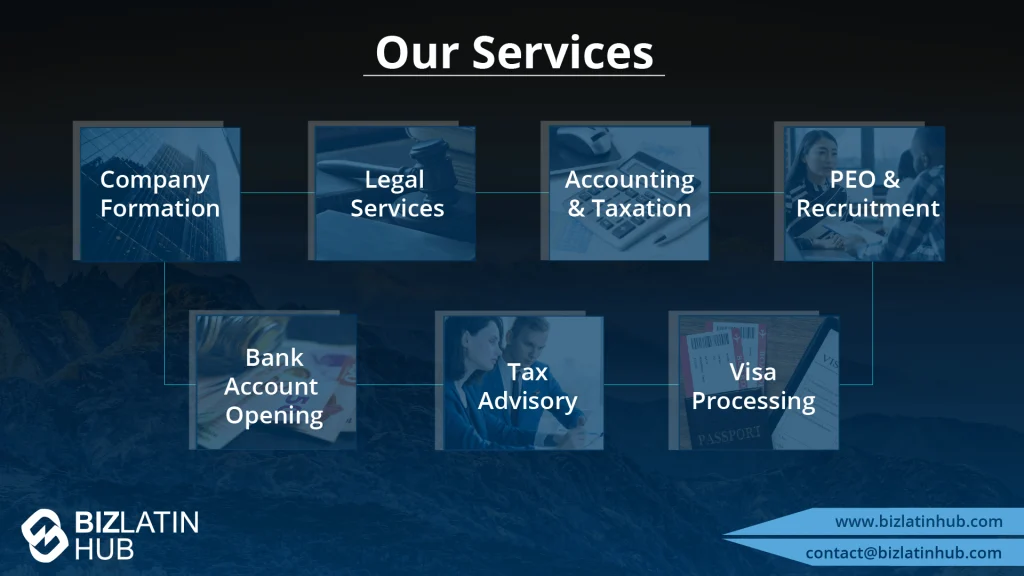Peruvian business culture is outwardly similar to that of its neighbors and elsewhere in the region. However, there are some local points that you will need to be aware of. If you are looking to incorporate a company in Peru, understanding local norms will make everything run more smoothly. Even if you’re just looking at the market, these tips will help you make a good impression, for example by learning the language and remaining formal.
With years of experience supporting foreign investors in Lima and across Peru, Biz Latin Hub understands the nuances of local business expectations and etiquette.
Key takeaways on Peruvian business culture
| Do you need to build personal relationships in Peruvian business culture? | A great deal of importance is placed on building personal relationships and knowing who you are doing business with. |
| How important is punctuality in Peruvian business culture? | Ignore the stereotypes and make sure you do things on time to make a good impression. |
| How popular is remote working in Peru? | It is growing rapidly in popularity, especially within the tech sector and with skilled professionals. Peruvians are also happy to work remotely for overseas companies. |
| Do you need to speak Spanish to do business in Peru? | Clear communication in English and Spanish will help both with business matters and with building those personal relationships. |
Peruvian business culture: 4 key points
There are many things to consider, especially in more isolated regions of the country or with more traditionally-minded people. Of course, we can’t cover every eventuality, but we’ve identified the four most important parts of Peruvian business culture for you to be aware of.
- Peruvian business culture is formal.
- Spanish unlocks doors.
- Be patient.
- Show respect.
1. Peruvian business culture is formal
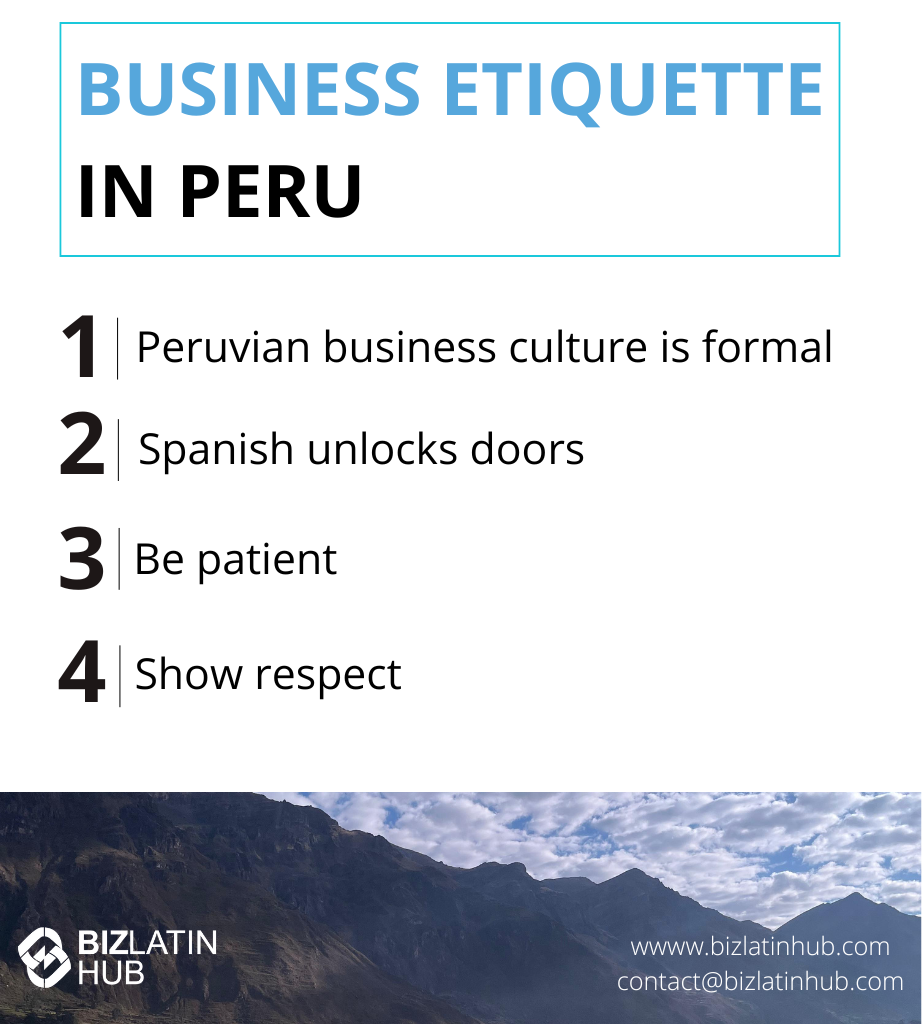
You may have an idea of Latin culture being relaxed and friendly. That’s certainly true away from the boardroom, but much less so in the corporate world. Dress is likely to be dark suits, collars and ties, even in tropical climates. It’s still common to refer to people by their titles rather than names.
Use formal titles and surnames in initial meetings. Men typically shake hands with direct eye contact. Among women or between men and women in more familiar contexts, a single cheek kiss is common. In Lima, introductions usually involve a firm handshake and formal address. Only after rapport is built might first names or informal greetings be used.
Formal and conservative attire is expected in major cities like Lima. Men should wear dark suits and polished shoes. Women are expected to wear elegant, modest outfits such as tailored dresses or blouses with skirts. In coastal cities or during hot seasons, lighter fabrics are acceptable, but appearance should remain professional.
2. Spanish unlocks doors
While you can expect almost all high-flyers to have a good command of English, it is unlikely to be their first language. You will certainly be able to communicate in English, but showing willingness to use Spanish will break the ice and show them that you are genuinely interested in their country.
3. Be patient
You may find that there is bureaucracy to deal with and seemingly interminable processes to handle. This is a well-known issue in Peruvian business culture and frustrates even locals. Keep calm but be firm with your wants and needs. This applies mostly to governmental bodies but may come up in private dealings too.
Peruvian business structures are hierarchical. Senior executives make the final decisions and should be treated with respect and deference. It’s common to meet with mid-level staff initially, but final approvals will likely come from the top—plan communications accordingly.
4. Show respect
Be careful when talking about the country. Peruvians may very well get frustrated with some of the country’s idiosyncrasies, but will not appreciate the same observations from foreigners. Stay diplomatic and avoid any mention of politics or other sensitive topics – your hosts may do so, but give uncommittal responses unless you understand the situation well.
Strong relationships are critical to doing business. Establishing trust through repeated meetings, personal rapport, and consistency is often more important than price or proposal content. Don’t be surprised if multiple lunches or informal conversations occur before any contract is discussed.
Business meals, especially lunches, are used to strengthen relationships. These gatherings are more personal than transactional. Allow your host to guide the conversation.” “Gifts are not required for meetings, but small tokens of appreciation—like branded items or regional treats—are welcomed during milestone moments.
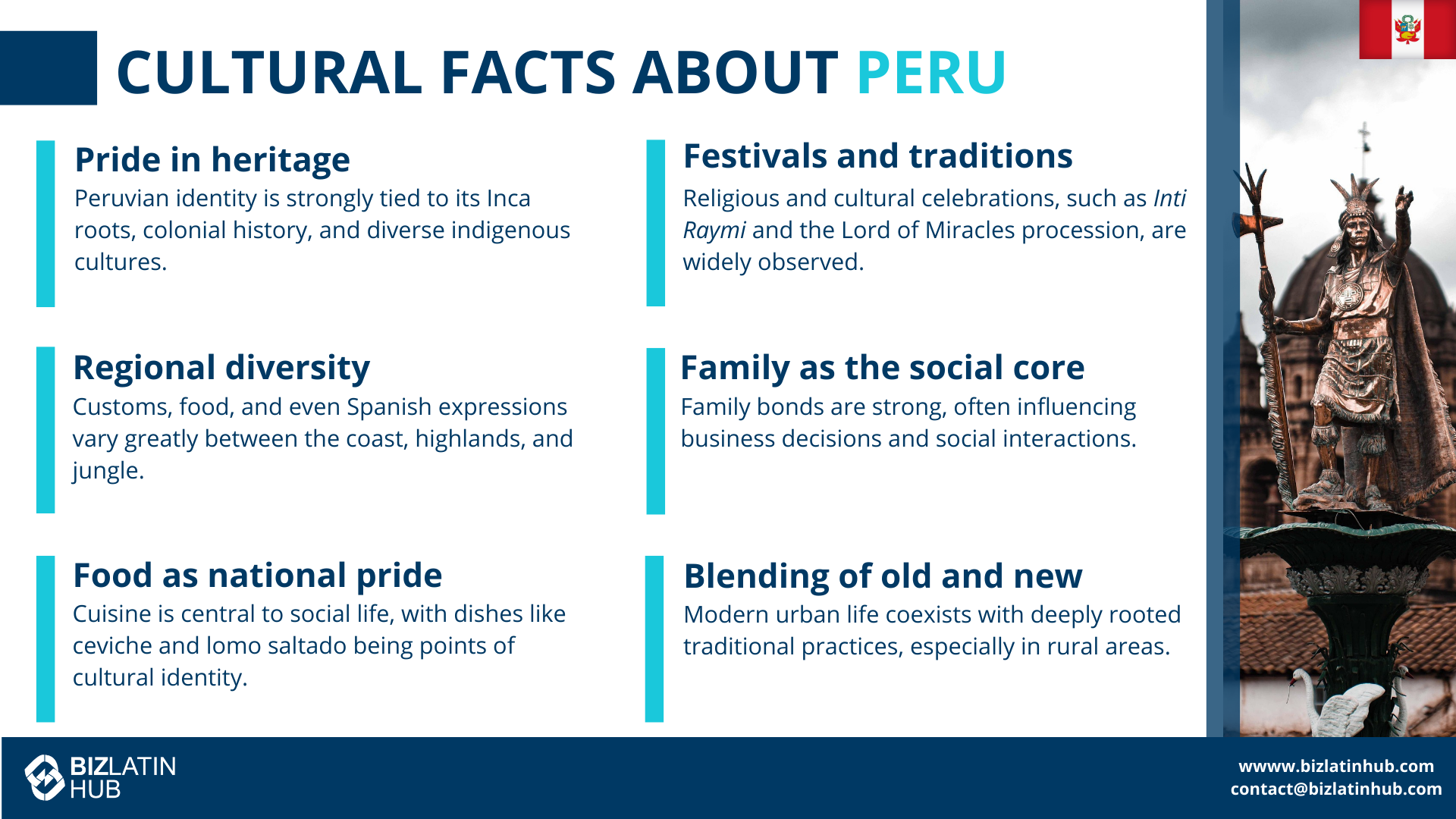
FAQs on Peruvian business culture
In our experience, these are the most common questions our clients have about companies in Perú.
1. Can a foreigner own a business in Peru?
Yes, a business can be 100% foreign-owned by either legal persons (legal entities) or natural persons (individuals).
2. How long does it take to register a company in Peru?
Registering a company in Peru takes 6 weeks.
3. How should I greet professionals in Peru?
Begin with a formal handshake and address colleagues using titles such as ‘Señor’ or ‘Licenciado’. In more informal or personal settings, a cheek kiss may be used—particularly between women or between men and women who are familiar.
4. What is the dress code for business meetings in Lima?
Professional and conservative. Men should wear dark suits and ties, while women should opt for tailored, modest clothing. First impressions matter greatly, so dressing well reflects respect.
5. How are business decisions made in Peruvian companies?
They follow a hierarchical structure. Decisions are made by senior leaders. It’s important to identify key decision-makers early and build rapport before presenting proposals.
6. Is trust important in Peruvian business culture?
Absolutely. Long-term partnerships are built on mutual respect and trust. Rushing negotiations can damage credibility. Take the time to nurture the relationship.
7. Do Peruvians prefer formal or informal business interactions?
Initially formal. Use titles, dress well, and maintain a professional tone. Once a relationship develops, the dynamic may become more relaxed—but formal respect remains important.
8. How are business lunches typically conducted?
They are social, often lasting 1–2 hours. Expect the first half to focus on personal conversation. Business matters are discussed only once the host introduces them. Politeness and attentiveness are essential.
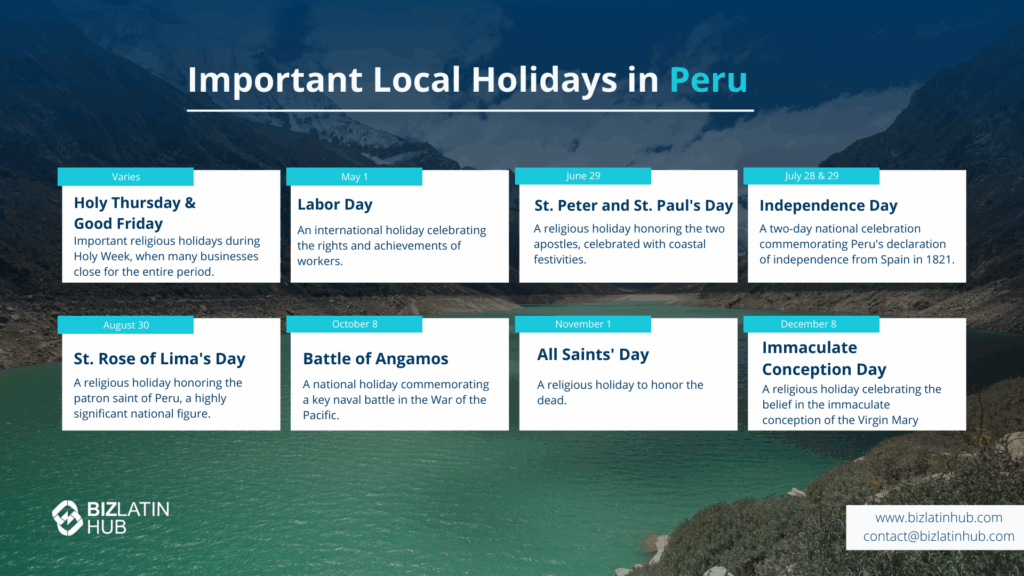
Why do business in Peru?
The country is developing fast and is targeting foreign direct investment. With a GDP (PPP) of USD$574bn and a predicted growth rate of 2.4% annually in the medium term, it’s a good time to be investing in the country. Add to that its free trade agreements and membership of alliances such as the CAN and Mercosur, deep-sea Pacific ports and good transport links and it’s easy to make it a hub for regional trade.
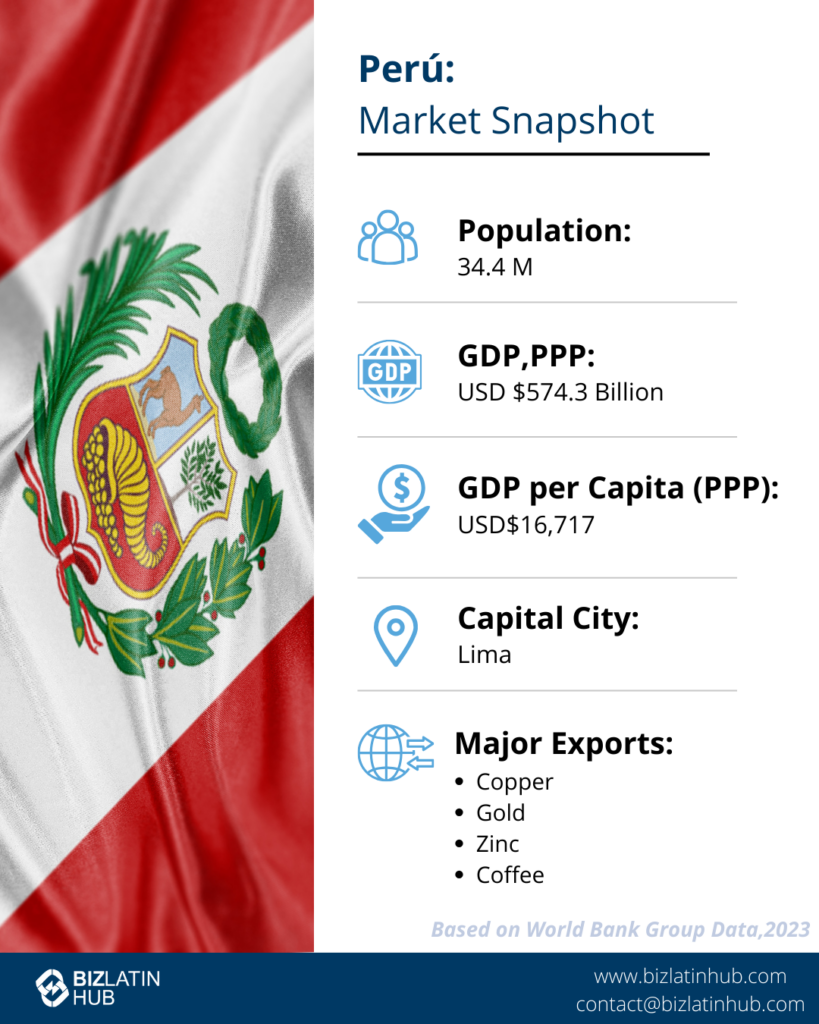
Biz Latin Hub can help you understand Peruvian business culture
While this guide is an excellent introduction to Peruvian business culture, it is always better to work with a local partner who is knowledgeable about the country’s business culture and customs.
Biz Latin Hub is the trusted local partner of many individuals and companies who have expanded their operations to Peru and elsewhere in Latin America. Get in touch with our team of experts today and we will help you and your business expand in Peru.
Learn more about our team and expert authors.
